Indonesia, the largest economy in ASEAN, is a pivotal player in regional trade. This makes shipping to Indonesia a critical component of trade in Southeast Asia. This blog explores Indonesia’s strategic location and geography, key considerations for shipping, and the essential compliance required for entering its market, providing insights and practical advice for logistics professionals looking to navigate the landscape efficiently.
Economy and Global Trade
Indonesia, having the largest economy in the ASEAN region, plays a crucial role in regional trade. In 2023, Indonesia’s total trade value reached USD 221.89 billion in import and 258.8 billion in exports. This global economic strength is powered by an extensive network of 4 regional agreements and 5 bilateral agreements involving partnerships with 27 countries. This broad range of trade agreements facilitates smooth international transactions, making shipping to Indonesia a significant trade in Southeast Asia.
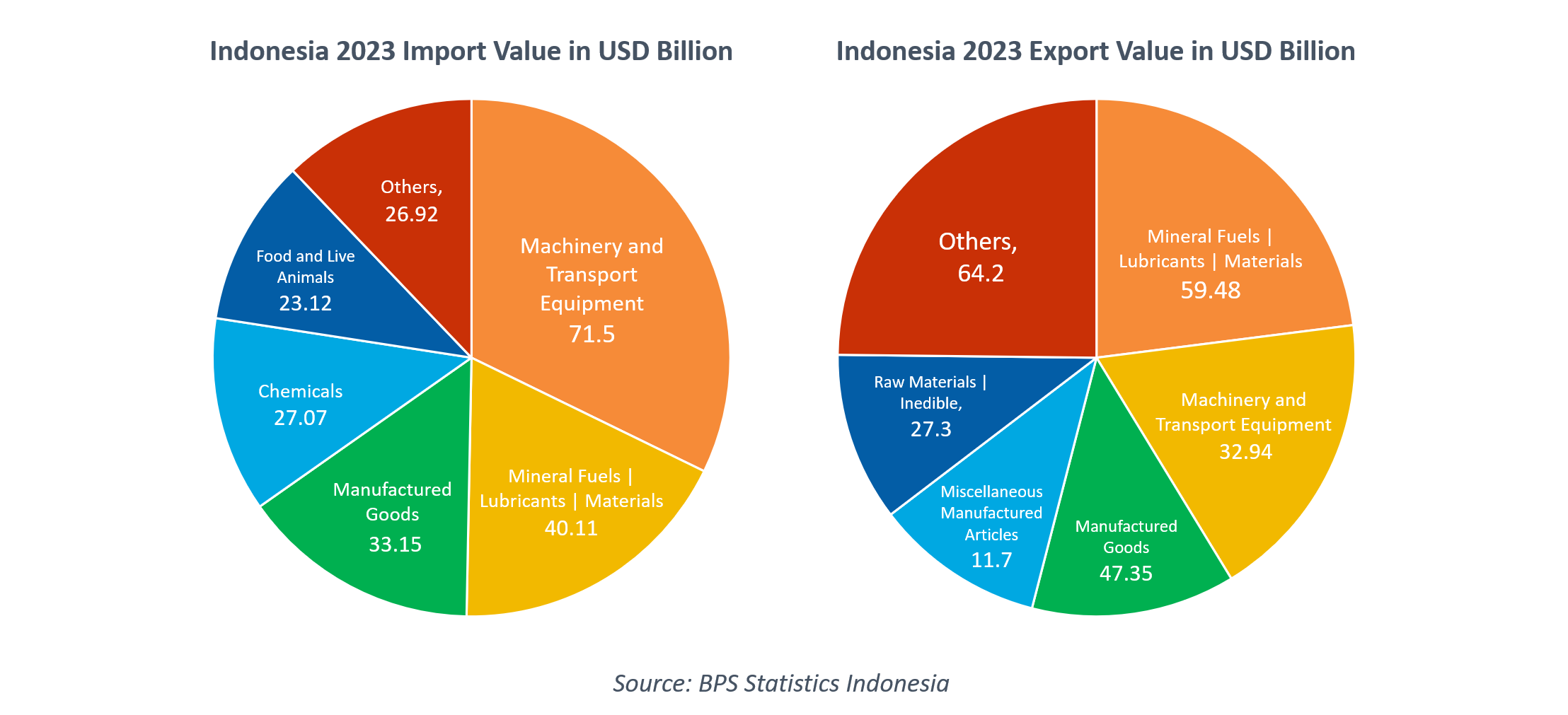
Location and Geography
Indonesia, the world’s largest archipelago, has more than 18,000 islands. Located between the Indian and Pacific Oceans, it is a key spot for international shipping routes. Major islands like Sumatra, Java, Borneo (Kalimantan), Sulawesi, and Papua cover a large area, bringing both challenges and opportunities for logistics.
Indonesia’s landscape has rugged mountains, dense forests, and long coastlines. This varied terrain affects transportation and logistics, requiring a mix of sea, air, and land transport. Positioned along important global shipping routes, Indonesia is a crucial point for trade between Asia, Australia, and the Middle East. Key maritime passages, like the Strait of Malacca, have a big impact on global shipping.
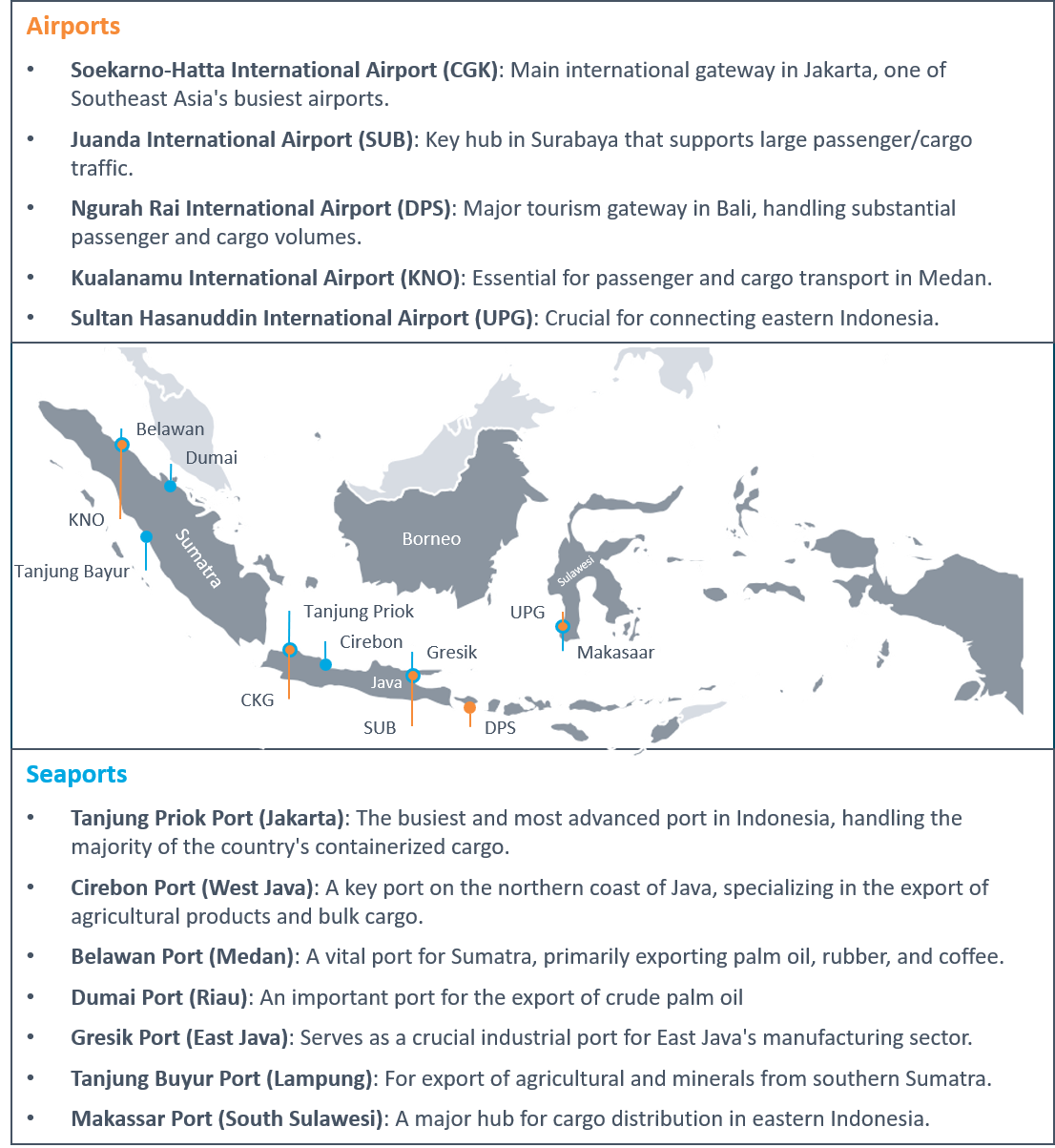
Key Considerations when Shipping to Indonesia
Navigating Indonesia’s shipments requires careful consideration:
Location
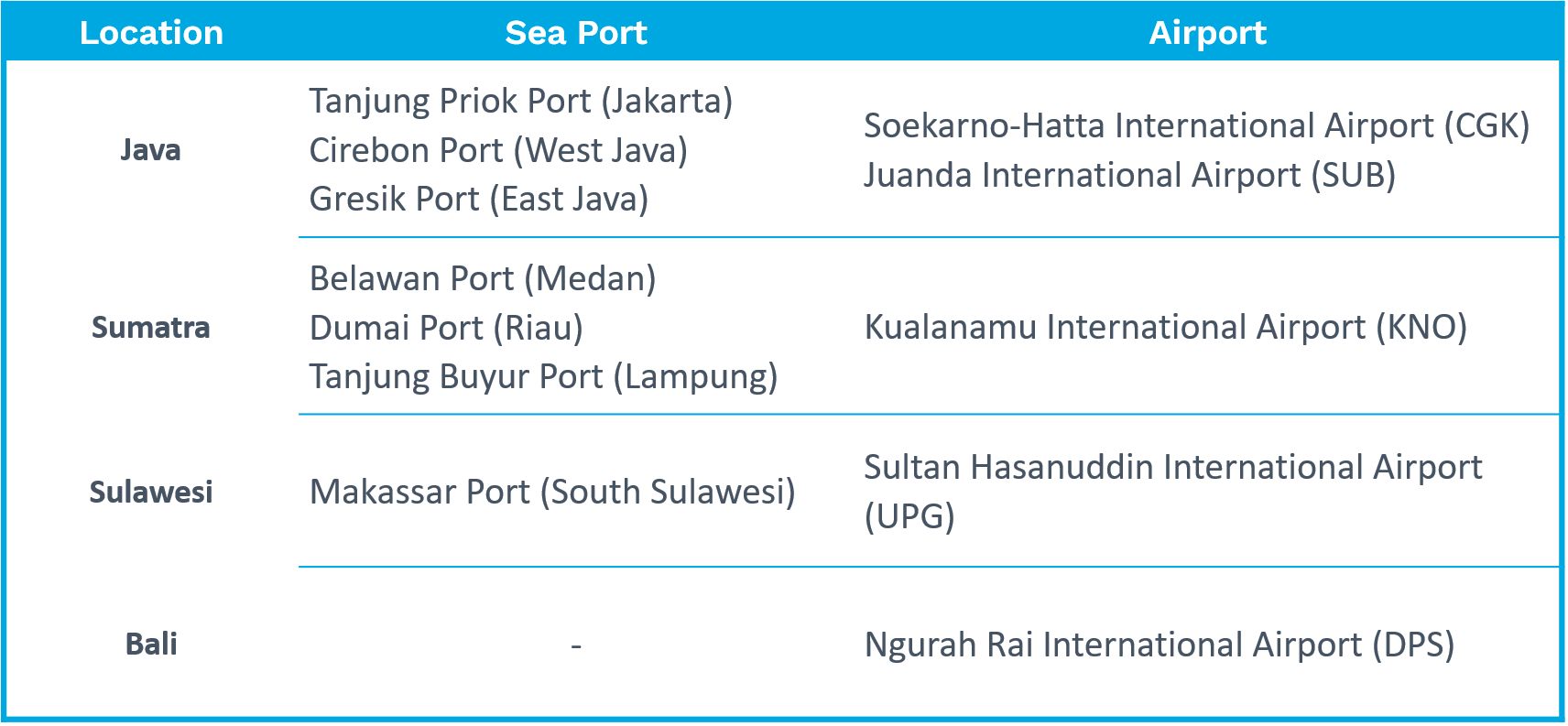
Commodity
Consider the nature of your cargo – it heavily influences your choice between air and ocean freight when shipping to Indonesia High-value items typically require air freight services, while lower-value goods are better suited for ocean freight. In Indonesia, air freight is commonly used for electronics, e-commerce goods, and perishables such as fruits. For ocean freight, palm oil, furniture, and garments are the common commodities being shipped out.
Time
The time sensitivity of your cargo is another crucial factor in selecting the appropriate mode of transportation. Air freight guarantees swift delivery. In contrast, ocean freight provides a more cost-effective alternative, with longer transit times.
Cost
Understanding the cost disparity between air and ocean freight when shipping to Indonesia is essential. The price of your freight depends on both the nature of your cargo and the urgency of delivery. Air freight cost tends to be premium making it suitable for urgent or high-value cargo. Conversely, ocean freight offers a more economical option for lower-value goods, unless expedited delivery is required. Learn how to reduce air freight cost form our eBook: How to Reduce International Air Freight Costs

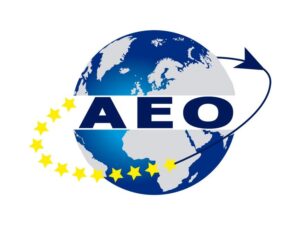 Local Customs Compliance
Local Customs Compliance
Understanding local customs compliance is crucial for ensuring a smooth process when shipping to Indonesia. Partnering with an Authorized Economic Operator (AEO) certified logistics provider is highly recommended. Shippers working with an AEO-certified partner benefit from reduced inspections and faster processing times. Dimerco Indonesia, with joint venture Uniair cargo, is among the few logistics providers that hold this certification.
Monsoon Season
The monsoon season in Indonesia, which brings heavy rainfall, lasts from October to March. During this time, it’s important to strengthen the packaging of your cargo when shipping to Indonesia, especially for high-value and sensitive items. Good packaging can protect your shipments from water damage, ensuring they arrive in great condition. Consider using waterproof wrapping, sturdy outer layers, and secure sealing to keep your goods safe during transit. Taking these precautions is essential for maintaining the integrity and safety of your cargo in the challenging weather conditions of the monsoon season. This is one of the key points covered in our eBook: Streamlining Global Logistics for Electronics Products.
Halal Compliance in Indonesia
In Indonesia, obtaining halal certification is essential for selling certain product categories. Without this certification, these products cannot legally enter the market. The key categories requiring halal certification include:
- Food and Beverages: This category includes everything from processed foods and fresh produce to meat, poultry, and various beverages.
- Slaughtering Services: Butchers and abattoirs fall under this category, requiring adherence to halal standards in their operations.
- Traditional Drugs, Quasi Drugs, and Health Supplements: This encompasses a range of products like medicines and dietary supplements.
- Cosmetics, Chemical Products, and Genetically Engineered Products: This includes makeup, skincare items, and household products made from chemicals.
Before shipping your products to Indonesia, it’s crucial to ensure they meet the required halal certification standards. Additionally, if your products fall under certain restricted categories, they must comply with LARTAS regulations.
- Verify HS Code: Confirm that your product classification aligns with halal certification requirements by checking the Harmonized System (HS) Code.
- Prepare Documentation: Assemble all necessary paperwork, including the application form and detailed descriptions of the product and its production facilities.
- Undergo Inspection: Schedule an inspection of your facilities by auditors from the Halal Product Assurance Organizing Agency (BPJPH).
After the inspection, the BPJPH and the Indonesian Ulama Council will evaluate the auditor’s report. If your product meets all required standards, you will receive a halal certificate, allowing you to sell in the Indonesian market. Ensuring compliance with these regulations is important when shipping to Indonesia. It not only opens up market opportunities in Indonesia but also helps build trust with consumers who prioritize halal-certified products.
eCommerce Fulfillment in Indonesia
Southeast Asia is a rapidly growing consumer market, with ASEAN countries representing 9% of the world’s population and a growing middle class of online buyers. Brands can reach these consumers through platforms like Shopee, Lazada, Tokopedia, and Blibli. However, setting up efficient B2C fulfillment in the region is challenging, especially for brands outside Southeast Asia.
The Pusat Logistik Berikat (PLB) eCommerce model in Indonesia addresses this challenge. Translated as Bonded Logistics Center, it is a multifunctional warehouse that allows goods to be imported and stored in bonded warehouses tax- and duty-free until sold online, providing significant cash flow benefits for small and medium-sized brands. Goods stored in these warehouses must be sold online, with a 7.5% duty for items under $1,500 USD and varying rates for those over $1,500 USD based on origin and HS codes. Storing goods in a PLB offers additional benefits:
- Customs processes are managed by the PLB, which can act as the Importer of Record (IOR) for foreign merchants or the Exporter of Record (EOR) for locals.
- Unsold goods can be re-exported without duties or taxes, and products can be stored for up to three years.
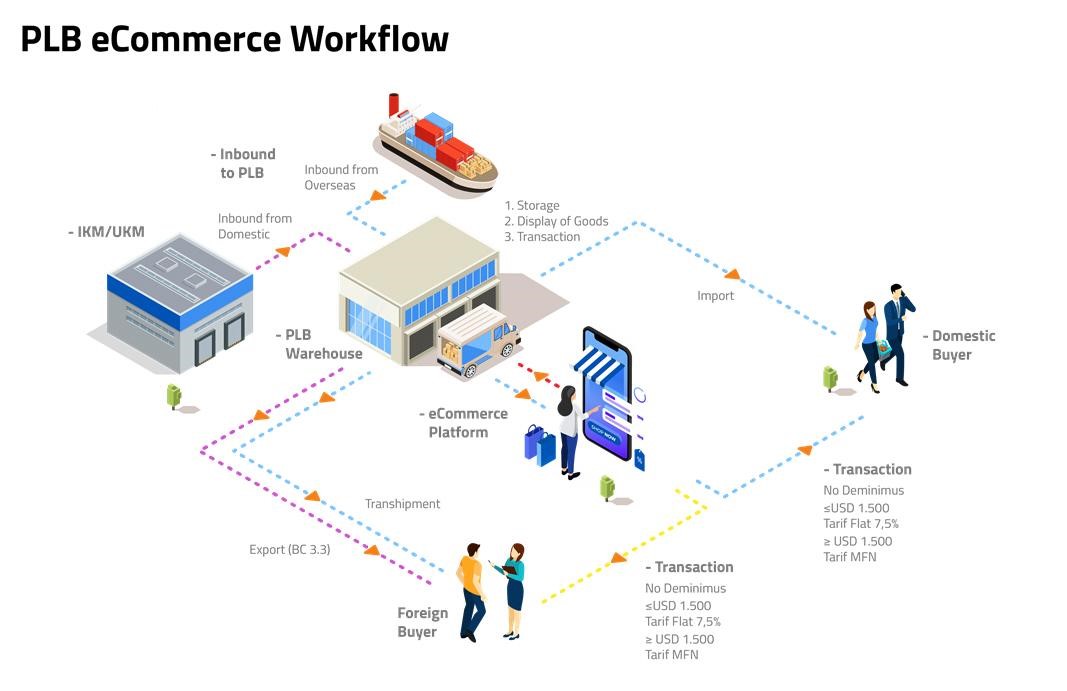
Dimerco, through its subsidiary Uniair Cargo, operates the only bonded logistics center in Indonesia, located in Bekasi near Jakarta, for fulfilling electronically traded goods. Dimerco handles B2C fulfillment for Lazada around Jakarta, processing up to 2,000 orders daily and expediting customs clearance for fast product availability. Learn more about the eCommerce Fulfillment Services in Indonesia.
Shipping to Indonesia
As Indonesia strengthens its role in global trade, understanding the complexities of shipping to this vast archipelago is crucial. By familiarizing yourself with the key considerations for shipping to Indonesia, you can choose the best options and anticipate potential challenges, optimizing your shipping process and ensuring smooth entry into the Indonesian market. Need a trusted logistics and freight forwarding partner in Indonesia? Contact Dimerco today to start a discussion.
